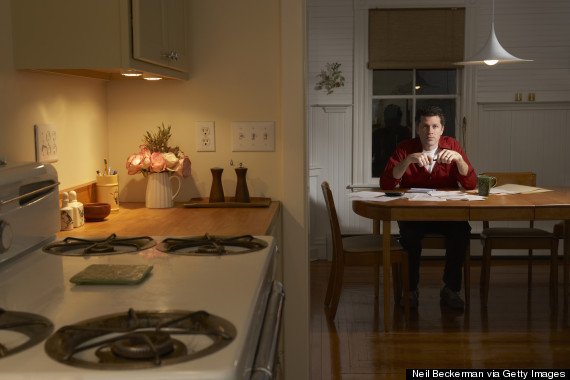There's a long path from one heart to another. How to find your way through the meandering maze of dating.
By Carlin Flora, published on July 1, 2009 - last reviewed on March 24, 2015
A
century ago, a 16-year-old Irish girl reluctantly arrived on Ellis
Island, betrothed to a much older pub owner about whom she knew nothing.
In love with a boy from her village, Bridget was devastated to become a
New World bride. And though her husband was a kind man who stayed with
her until his death, they never became close. She often let slip her
lingering bitterness.
One hundred years later, my own experience of single life in New York
City could not have been more different. Bridget, my great-grandmother,
had just one ship ride between
adolescence and
marriage; I've had 15 years of
dating.
Her life was charted for her, her own feelings and wishes irrelevant. I
had nothing but feelings and wishes to guide me. I had plenty of
enriching experiences, but I also felt by turns anxious, rejected,
guilty
about rejecting others, and just plain lonely. I could choose unwisely,
and there'd be no one else to blame. Autonomy is great, but it is not
without its burdens. My tale concludes more happily than Bridget's: I
have the luxury of looking forward to a life with my true love.
Somewhere between Bridget's arranged marriage and my protracted
floundering lies a vast middle ground of single life that can be
navigated happily, with an eye toward one's ultimate goal: often, but
not always, a committed partnership. It takes only a few principles of
human
nature,
and insight into one's own desires. While there's clearly no formula
for how to meet The One, psychologists agree on beliefs and strategies
that inadvertently hold people back. This is not to say that the
uncoupled are necessarily doing anything wrong; they may just not have
stumbled into the right cafe at the right time.
Nonetheless, it's worth taking an inventory of your romantic life.
The successful single will be willing to turn a non-defensive eye toward
his or her own dating patterns. Here I explore a few romantic cul de
sacs that many singles encounter.
Dating Shake-Up #1: Get Out the *%*#$&(*# Door
Lady luck can seat you next to a gorgeous stranger at an open-air
jazz concert. Watching TV in your living room, however, hardly
facilitates serendipitous encounters. Putting yourself out there is a
prerequisite to curing the
loneliness that settles over you when you spend too many nights in.
Maybe you dread getting overlooked by people you'd meet if you were
socializing. Or perhaps you're afraid that if you do get into a
relationship you'll be distracted from other important
goals. Whatever the hesitation,
online dating
could be a good way to get to know who's out there while maintaining
control and privacy. Still, if you want to partner up, you'll have to
get out eventually.
Ask a trusted friend to act as social coordinator—and simply promise
to show up. Talk to someone openly about your self-perceptions to see if
they match others' ideas of who you are. Take on new work or
extracurricular challenges to increase your
self-esteem and your confidence that you can handle the pressures of the singles scene and are an attractive addition to it.
Dating Shake-Up #2: Cut out Choosiness—and Stop Choosing Poorly
Snapshot of the
decision-making center of a twentysomething's mind at a dinner party: "The girl sitting next to Chris is friendly, and she's a
politics
geek, just like me. But there's that speed-dating thing at the brewery
next week, plus I haven't written back to that blonde I met online last
Thursday...."
Barry Schwartz, a professor of psychology at Swarthmore, has shown
how gluts of products paralyze consumers, and he's convinced that dating
overload can similarly hamstring singles. "The temptation to not choose
is great in a world where there is a large number of options," Schwartz
says. He advises shoppers to settle on "good enough" purchases, but
finds it much harder to convince singles to apply the strategy to their
love lives. "People think they need to find the absolute 'best' romantic
partner for them," Schwartz says. "But I believe that making a
commitment is an act of faith. If you wait until you're sure, you'll die
alone."
Even if you're not too picky, you may consistently fall for people
who aren't right for you. You're attracted to bad boys or girls—a shot
of adrenaline into a routine-filled life, but a letdown when you need a
dependable companion. Or you gravitate toward quiet types, but soon
enough feel frustrated with their lack of verbal input.
We learn how to relate to people through our family members and other
significant relationships in early life. Sometimes those relationships
aren't easy or healthy, but they are what we know. We may have even
developed a role to fit into our clan—say, the overachiever or the
peacemaker. Say you were the charmer in your home, the one who pulled
everyone else out of dour moods. If you were to meet a man who needed
constant bucking up, you'd be comfortable and quite effective. But just
because the arrangement would feel comfortable and familiar doesn't mean
he'd be a great partner who could support you emotionally.
You may even be attracted to particular people out of a desire,
conscious or not, to rewrite bad endings. Chicago therapist Wendy Wasson
recalls a patient who had a critical, judgmental father. The patient
began dating someone who was accepting at first. But when he became
distant and negative, she was suddenly desperate to please him. She
wasn't consciously aware that her boyfriend shared traits with her
father, but Wasson helped her see that on some level she was trying to
rework that family dynamic by winning the man over.
If you're not sure whether you have a misguided yen for a certain
type, list your past sweethearts' prominent traits. While you're at it,
write down ten qualities that describe your ideal relationship. Instead
of a grocery list of what you want in another person (blue eyes, likes
hockey), this should detail what you value and what you most want
someone else to bring out in you (we would hold each other to our goals,
we would
laugh frequently).
Psychologist M.P. Wylie, a relationships coach, puts clients through
this exercise to remind them that all pairings are a pas de deux of
personalities. It also encourages people to separate real deal-breakers
(doesn't want kids) from nitpicky requirements that might screen out
true love. You say you require a college grad, but what if you meet an
ambitious autodidact who doesn't have that piece of paper? He or she
might fulfill your desire for a partnership that fosters intellectual
growth, even though the person wouldn't meet your checklist.
Dating Shake-Up #3: Don't Fall in Love with Love
Nicole had been daydreaming about their third date when his email
popped into her inbox. All week she'd built up an ironclad case for why
he was perfect for her, and marveled at how their interests dovetailed.
Her friends were going to be so impressed!
The message was an unaffectionate request to reschedule. She felt a surge of
anger:
How could he act like this? Why wasn't he at least excited to see her?
She'd set herself up for disappointment because she expected him to
conform to her fantasy, and not the reality—they barely knew each other.
Moving too fast, either by projecting hopes onto someone or by
speeding up a natural getting-to-know-you phase, skews your ability to
objectively judge a prospect.
"If
attachment
is the glue in relationships, then an accelerated attachment is like
super glue. It activates a willingness to overlook and minimize obvious
problems, it blinds your vision, and it intoxicates your emotions and
hormones so that you feel safe and secure in this newfound love," proclaims psychologist John Van Epp in his book
How Not to Marry a Jerk.
In the early stages of romance, it's
wise
to make non-date-related plans that are as exciting to you as your
prospective partner is. And mom was right: Don't jump into bed right
away.
Sleeping with someone prompts your
brain to release neurochemicals such as
oxytocin
that spur bonding and make you feel more connected to and dependent on
your bedmate than is wise at an early juncture. The bonding phenomenon
is stronger for women in general, though men who have been without
someone for a while can also become overly attached to a new
sex partner in the absence of genuine affection, Van Epp says.
Once you know you can truly trust a dating partner, sexual intimacy
can strengthen the connections you've already forged. But if the
physical aspect of the relationship swamps your total time spent
together—ideally in a variety of situations—you're at risk of ending up
with someone who won't be good for you in the long run.
You're probably marshaling counterevidence in the form of happily
married couples who slept together on their first date and who are
convinced that the amorous fast track had no negative impact on the
ensuing relationship. That's great for them, but if you want to aim for
better relationship outcomes overall, consider waiting it out.
Dating Shake-Up #4: Heed Early Clues to Character
One of my friends stopped dating a smart, sweet, beautiful woman
after discovering she possessed, of all horrors, a Celine Dion CD.
Another friend continued seeing a guy for six months even though he
conducted lengthy phone calls with his ex and other women in front of
her.
Assessing a partner's worthiness is part art, part science: You must
measure and weigh a constellation of quirks and qualities without losing
sight of the whole person. How can you tell whether a single
incompatibility is a deal breaker or an annoyance worth tolerating? Keep
your eyes open for behaviors that signify distasteful and deeply-rooted
attitudes. Don't rationalize consistent displays of disrespect or
irresponsibility—observe them carefully. Such bad behaviors will only
get worse over time, when people are no longer out to impress you. The
best marriages are the ones preceded by happy dating relationships, so
take your partner at face value and don't expect situations to magically
improve over time.
However, it's only fair to raise your concerns to your partner, and
to give him or her a chance to change. Within a healthy relationship
some behaviors are moldable. Gently bring up the issue ("sometimes it
seems that you're not listening to me when I tell you stories") in order
to put it into what Van Epp calls the "machinery" of the relationship.
Your girlfriend may need to be reminded a few more times of her habit of
spacing out while you talk, but it's possible that after that, she will
become a rapt listener. If you catch her daydreaming three or four more
times, however, you have your answer as to whether or not she is
capable of tuning in. You then must decide if you can live with that
trait or not. If you can,
discipline yourself to not get upset at the behavior, since you decided to put up with it.
Dating Shake-Up #5: Push Yourself Out of Your Patterns
While it's a vital first step,
understanding
the patterns in your behavior isn't enough. You must continually make
yourself do what doesn't come naturally. It's comfortable for you to
reject short men. So say yes to the next one who flirts with you. It's
easy for you to become overly dependent on new boyfriends, texting them
every hour. So hide your phone and resist the urge. It's tempting to cut
things off before your new love starts talking about "the future"—so
bring up the topic yourself.
Consider a woman who was magnetized by macho men. Her alluring
suitors quickly morphed into angry jerks. The consequent fights and
breakups were devastating, and yet they never deterred her from going
back for more with a new tough guy. Van Epp encouraged her to accept a
date with a sensitive young man. Her mission was to expand her comfort
zone: Even if it didn't work out, she'd be more open to prospects like
him in the future. She began spending time with him, and he didn't
thrill her. But she stuck to it and paced the relationship well,
forgoing sexual contact. After a few months, she developed intimate
feelings toward him that finally blossomed into a physical attraction.
After a year, she fell deeply in love and married him.
Not all experiments in pattern breaking work out so well. Even after
you've changed your counterproductive tendencies, you may still get your
heart broken. In the face of such disappointments, you must be careful
not to beat yourself up or write off every last member of the opposite
sex.
Being single longer than you'd expected gives you the opportunity to
find your way through a variety of entanglements and to understand how
different sides of yourself emerge based on how you conduct your
relationships and whom you choose to get close to. It also gives you the
chance to build satisfying friendships.
"When singles realize that they need to take responsibility for
themselves, they often feel empowered," says Wasson. "And learning to
appreciate other emotional bonds helps them build
resilience."
Wasson, who was single for much of her life, notes that when she met
her partner in her 50s, he truly valued the life she had built for
herself. It was, in fact, part of her appeal.
Wasson encourages single men and women to throw themselves into life when they least feel like doing so.
"If you take out a mallet or get cynical, it keeps you from moving
on," Wasson says. "Staying confident is, after all, what attracts
people."
In retrospect, although it wasn't always pleasant, being single lent
me precious time to make and nurture a wealth of friendships. I might
not have forged such strong bonds had I not needed dating advice and
support. In this sense, my romantic quest was worthwhile in more ways
than one.—
Carlin Flora
The Commitment-Phobe
The Dilemma:
A commitment-phobe might
fear
the end of youth, or he (yes, they are often, but by no means always,
male) may just be itchy at the thought of a long-term vow. They are not
likely to identify themselves as having commitment issues, however,
since in their mind there is always a good reason not to move forward
with a relationship. Their stasis breeds misery on both sides: The
commitment-phobe is paralyzed and his or her partner is left feeling
hurt and rejected.
The Plan:
Life sometimes catapults even the most reluctant lover into
commitment: Advancing age, housing logistics, or a recognition that the
perfect has become the enemy of the good can all reform the staunchest
commitment-phobe.
"Sometimes it's easier to leap off the cliff than to walk slowly down
the diving board," says psychologist and writer Judith Sills. Many
people would be happier eloping than dragging out wedding proposals and
plans.
Marriage is a big decision, but it doesn't determine everything that
happens thereafter. "We don't make mistakes," says Sills. "We build or
create mistakes over time." Paradoxically, the reluctant party's
relationship may get much better after he takes the leap. This leaves
commitment-phobes locked into a self-fulfilling prophecy: They don't
feel passionate enough toward someone, so they break up and then think,
"Thank God I didn't commit to her!" But if they had committed, the
passion might have flowed after the fact.
There's at least one broad exception. Charles Waehler of the
University of Akron found that middle-aged bachelors who are unsatisfied
in life and ambivalent about marriage remain conflicted after marriage.
The Single Parent
The Dilemma:
Single
parents
often fear that their desire to find someone will lead them to overlook
their children's needs or feelings. They wonder how their kids will
react, and how all of the moving parts of their family and their
prospective new love's family will fit together.
The Plan:
Block out a privacy zone, counsels Sills. Kids don't need to know
dating details, and they certainly don't need to be confronted with any
aspect of their parent's sex life.
When someone is important enough to be introduced to a child, the
parent should have him or her over for dinner. But they shouldn't
stage-manage. Let everybody find out about each other naturally. And the
parent shouldn't do a post-mortem on the encounter, warns Sills.
"Sometimes when we put things into words we get committed to a point of
view about someone."
Bringing home a new dating partner may very well stir up children's fears about
divorce or death or the future. The important thing is to let the kids have such feelings. They will adjust to the situation over time.
And avoid the "pseudo-marriage" trap: If you've been married, it's
tempting to rush into sharing lives and household duties with someone.
But this can put undue strain on a budding relationship.
The Older Single
The Dilemma:
Younger singles searching for love often look to
midlife
and beyond with a marked fear that they will still be alone. But
midlifers often find the experience of being single easier than it was
during their reproductive years, when they may have felt dramatically
out of step with married friends, says Wendy Wasson. Suddenly, they're
forging new connections with peers who are divorced or widowed.
The newly single camp can be more difficult: People feel like
failures after the breakup of a long partnership, or undergo a lengthy
grieving
process after having experienced a partner's death. Yet Wasson sees a
bright side: She's witnessed patients develop a renewed sense of
vitality and
optimism
after a panicky adjustment period. People—especially women—often
reorganize their lives around friendships (old and new) and look forward
to a more independent and open-ended way of life.
The Plan:
Broadening one's horizons is not just a pragmatic way to approach the social scene; it's also the key to finding unexpected
happiness in midlife. In her book
Getting Naked Again: Dating, Romance, Sex, and Love When You've Been Divorced, Widowed, Dumped, or Distracted,
Judith Sills argues that older singles should consider a wider range of
prospects, since they're not looking to create a family. "It doesn't
matter if a woman shares your
religion,
for example, if you're not raising children together," she says. Sills
says that women concerned about the lack of available older single men,
for example, should not evaluate men they meet in terms of whether they
are marriage material, but should rather enjoy and embrace what they do
have to offer—be it
friendship, companionship, help, or guidance in cultivating new hobbies or interests.
Middle-aged singles may find that the autonomy and social skills
they've built up over the years give them a confidence in the world that
they never had as young people. In fact, several interview-based
studies of single women aged 40 and above revealed that they felt a
greater sense of clarity and agency than ever before. They'd managed to
fulfill their needs to nurture others (perhaps via nephews and nieces)
and to feel supported (often by strong friendships and family ties).
Furthermore, they were freer to express themselves since they no longer
felt constricted by expectations about marriage that may have once
sparked regrets or insecurity.

















